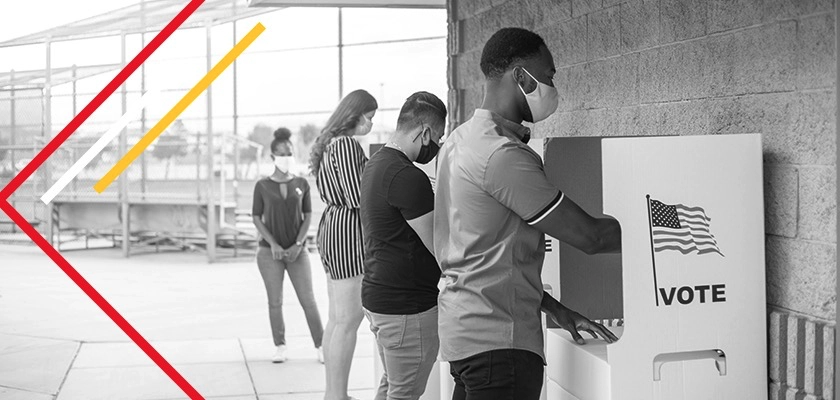"Power to the (Young) People: How Millennials and Gen Z Helped Elect Joe Biden President" - Jill Quadagno, Ph.D. | November 2021
Guns, climate change, racial justice, and the response to COVID-19 all alienated younger voters from the Trump administration and lead to the election of Joe Biden.
Professor Emerita
Florida State University

In every presidential election, older people have exerted an outsize influence for one reason: they are the most likely to vote. The 2020 election was no exception. More than 70 percent of people 65 and older voted, and 52 percent of them favored Donald Trump. Why, then, did the sitting president lose by more than 7 million votes?
The answer comes from an unexpected source—the political mobilization of Millennials, who are now in their 20s and 30s, and Gen Z, who voted for the first time in 2020. That year, young adults turned out in greater numbers than any previous election, and they strongly favored Joe Biden (U.S. Census Bureau, 2021).
Overall, 65 percent of voters ages 18 to 24 voted for Biden, as did 54 percent of voters ages 25 to 29 (Hess, 2020). Support for Biden was even higher among younger voters of color. Eighty-seven percent of young Blacks voted for Biden, as did 83 percent of young Asians and 73 percent of young Latinos (CIRCLE, 2020). In key battleground states, their votes were the deciding factor.
Voting preferences based on age differences are a product of cohort differences in demographic characteristics and values. A cohort is “an aggregate of individuals who experience the same event within the same time period” (Ryder, 1965: 845). Although cohorts can be identified by any number of traits, such as year of entering college, the most common trait used is birth year. Each birth cohort develops a distinctive identity based on its features and developmental experiences. Twentieth-century birth cohorts include the Silent Generation (1928–1945), the Baby Boomers (1946–1964), Generation X (1965–1980), Millennials (1981–1996), and Gen Z (1997–2017).
How do Millennials and Gen Z differ from older cohorts?
First, they are more educated. Nearly 40 percent of young adults have a bachelor’s degree or higher, compared to 27 percent of people 65 and older. Education level helps predict party affiliation: college-educated voters favor Democrats, while those without a college degree, especially white men, lean Republican.
Second, Millennials and Gen Z are more racially diverse. Nearly 60 percent are members of a minority group, compared to just over 20 percent of people 65 and older. Like education, race and ethnicity have a significant impact on party preference, with 40 percent of Democrats being nonwhite compared to 17 percent of Republicans.
Third, Millennials and Gen Z share key values that predispose them to favor the Democratic Party (Parker, Graf, and Nik, 2019). They are more likely than older cohorts to believe that racial and ethnic diversity is good, that the government should do more to solve problems, and that Black people are treated unfairly. They have more positive views of interracial and same-sex marriage and are more accepting of transgender people.
Several hot-button issues that took center stage in the period leading up to the election also turned Millennials and Gen Z toward Biden. One event was the mass shooting at Parkland High School. It inspired many young people to speak out against gun violence and to condemn politicians (mostly Republicans) who received donations from the National Rifle Association (Hess, 2020). Another issue was climate change, a phenomenon Trump dismissed as a left-wing conspiracy. Seventy-one percent of Millennials and Gen Z see climate change as a top priority to ensure a sustainable planet, compared to 57 percent of Boomers (Tyson, Kennedy, and Funk, 2021). The Black Lives Matter movement also brought huge numbers of young people into the streets protesting police violence and registering to vote. Finally, there was the economic fallout from the COVID-19 pandemic, which young people, in particular, felt Trump mishandled (Harvard Youth Survey, 2020).
Guns, climate change, racial justice, and the botched response to COVID-19 all alienated younger voters from the Trump administration in particular and Republicans in general.
The results of the 2020 election suggest that the Republican Party will continue to lose support as Boomers age and Millennials and Gen Z become a larger share of the electorate. They are already more politically attuned than previous cohorts of young adults because of who they are, what they believe, and what experiences they have shared. Their values of inclusion, equality, and fairness translate into an overwhelming preference for Democratic Party policies and candidates (Winograd and Hais, 2020). They will likely be advancing progressive politics and values for decades to come.
Questions for Discussion
- How does the concept of cohort help explain voting behavior based on age differences?
- What are the distinguishing features of your cohort in terms of demographic composition?
- What other factors might have affected the voting preferences of Millennials and Gen Z?
References
CIRCLE. (2020). “Election Week 2020: Young People Increase Turnout, Lead Biden to Victory.” Center for Information and Research on Civic Learning and Engagement. Tufts University. https://circle.tufts.edu/latest-research/election-week-2020#the-black-youth-vote
Harvard Youth Survey. (2020). “Spring 2020 Harvard IOP Youth Poll Results.” https://iop.harvard.edu/about/newsletter-press-release/spring-2020-harvard-iop-youth-poll-results
Hess, Abigail. (2020). “The 2020 Election Shows Gen Z’s Voting Power for Years to Come.” CNBC. https://www.cnbc.com/2020/11/18/the-2020-election-shows-gen-zs-voting-power-for-years-to-come.html
Parker, Kim, Nikki Graf and Ruth Nik. (2019). “Generation Z Looks a Lot Like Millennials on Key Social and Political Issues.” Pew Research Center Report, January 17, 2019. https://www.pewsocialtrends.org/2019/01/17/generation-z-looks-a-lot-like-millennials-on-key-social-and-political-issues/
Ryder, Norman. (1965). “The Cohort as a Concept in the Study of Social Change.” American Sociological Review 30:843-861.
Tyson, Alec, Brian Kennedy and Cary Funk, (2021). “Gen Z, Millennials Stand Out for Climate Change Activism, Social Media Engagement with the Issue.” Pew Research Center, May 26. https://www.pewresearch.org/science/2021/05/26/gen-z-millennials-stand-out-for-climate-change-activism-social-media-engagement-with-issue/
Winograd, Morley and Michael Hais. (2020) “A Rising Blue Tide Lifts the Nation.” Brookings Institute. https://www.brookings.edu/blog/fixgov/2020/11/16/a-rising-blue-tide-lifts-the-nation/
U.S. Census Bureau. (2021). Reported Voting and Registration by Age for the United States, Table 3. https://www.census.gov/data/tables/time-series/demo/voting-and-registration/p20-585.html



